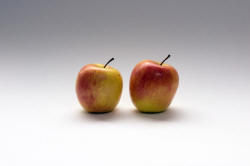Lexis: words and meaning

Without grammar, very little can be conveyed. Without
vocabulary, nothing can be conveyed.
Wilkins (1972: 111)
So we shouldn't underestimate its importance.
This is a short guide to lexis and meaning and much more detail s available by following the links at the end.
 |
Two types of words |
The following focuses on what are usually known as
content or lexical
words. These are the words which carry meaning in the language
rather than grammatical information. Content words lie in open
class systems. I.e., we can create new content words to describe
new objects actions or qualities.
Non-content words (or function words) belong in closed classes. We
do not easily (or ever) make new prepositions, pronouns or conjunctions,
for example. There is a
guide to function
words on this site.
Which one of these are real words in English? Click for some comments when you have a list.
|
|
|
|
Well, it's quite hard to tell and different people will have
different responses.
Few people would pick scropplededuk and jhgkplkrtsdmnb
as real words but many might choose any or all of the others because
it's actually rather hard to decide what exactly constitutes a word.
(If you are wondering, scissel is waste metal from punching discs and a
walleroo is a kind of kangaroo.
Even if you didn't recognise the word, you should be able to see that
it's a possible word in English in a way that jhgkplkrtsdmnb is not.)
You may have had trouble deciding whether a word can have two elements
or more or can contain an apostrophe or a hyphen. We shall shortly see
that this is really a non-question.
 |
Tests for words |
Here are some traditional tests for words but they all have
objections. Look at the list and decide what the objections to the
rules could be. Think, Yes, I see, but what about ...?
Click on the
![]() when you have thought of some objections.
when you have thought of some objections.
| Testing for a word | Yes, but ... |
| Test 1: POTENTIAL PAUSE: Say a sentence aloud and ask someone to repeat it slowly – the pauses will fall between not within words. |
Yes, but we don't always pause between
words. Say something like
I've an idea
aloud.
Did you pause between the words? No, probably not.
|
| Test 2: INDIVISIBILITY Say a sentence aloud and ask someone to add extra words to it. The extra items will be added between not within words. |
Yes, usually, words in English are not divisible
but many languages (e.g., Arabic) use infixes inserted into words and even
English can do it sometimes:
absobloodylutely it can (although
technically, that's an example of tmesis).
|
| Test 3: MINIMAL FREE FORMS Words are the smallest units of speech that can meaningfully stand on their own. |
Yes, but do function words like
the and
for meaningfully
stand alone? Arguably, one of the definitions of a function
word is that it cannot meaningfully
stand alone.
|
| Test 4: PHONETIC BOUNDARIES It is possible to tell where a word finishes from the stress pattern of the sentence. |
Yes, but sometimes you can't tell.
Try saying
the boys have eaten and
the boys of Eton
quickly. Try again with
I scream
and
ice cream.
|
| Test 5: SEMANTIC UNITS Words represent 'units of meaning' as in Dog bites vicar. |
Yes, but some units of meaning in English
are made up of multiple words:
The Labour Party, look after,
pick over etc. And some of these are obviously separable,
too, and that's another problem with Rule 2 (e.g.,
He picked it
up).
|
For all of these reasons, linguists have chosen virtually to abandon
the term 'word' and use the term lexeme or
lexical item instead.
The advantage is that these terms will cover tricky examples like
The European Union, the black sheep of the family, care for, thunder and
lightning etc. as well as 'normal' words because all of them act as
single concepts. For the purposes of what follows, word =
lexeme.
 |
Morphemes |
A morpheme can be defined as the smallest meaningful unit of meaning.
All of the following are morphemes but they are of two sorts. Can
you identify what the categories are?
Click
here when you have an answer.
| boy | dis- | -ing | full / -ful |
| done | un- | berry | ham |
| field | house | keep | over |
Free morphemes are those which can stand alone and carry meaning:
boy, done, full, berry, ham, field, house, keep and over
are all free morphemes. We can have, e.g.
boyish [where boy but not ish can stand
alone]
overdone, fulltime, blackberry, hamburger, fieldwork,
housekeeper [where both morphemes can stand alone]
etc.
Bound morphemes are units of meaning which cannot stand alone: dis-,
-ing, -ful and un- are examples here. We can have,
e.g.
disbelieve [where the verb can stand alone but its prefix
cannot]
playing [where the grammatical suffix cannot stand alone]
Note that some morphemes can function both ways:
boyhood [both boy and hood can be stand-alone
nouns]
blackberry [black can be a stand-alone adjective and
berry a noun]
hamburger [a difficult case; see below]
fieldwork, housework [where both morphemes are also stand-alone
nouns]
overcome [where the first element can be a stand-alone
preposition or adverb and the second a stand-alone verb].
There are problems with morphemic analysis. What's the cran
in cranberry? Is it ham+burger or hamburg+er?
Nevertheless, morphemic analysis can be a powerful aid in teaching
lexis.
See the section on
word formation for more.
Mini-test: How many morphemes are there in His hopeful words really encouraged me? Click here for the answer.
Answer: 11. HIS HOPE FUL WORD
S REAL LY
EN COURAGE D
ME
(Bound morphemes in this colour, although FUL
can be a free morpheme. Morphemic analysis doesn't worry about
spelling.)
 |
What does 'mean' really mean? |
When we think about what words mean, we are usually considering
denotation, i.e., what the words signify. For
example,
ship = floating transport
table = flat surface on legs
What do these words mean? Click here when you have an answer.
ceiling, pig, demonstrator, partisan, queer, fascist, tight-fisted, thrifty
We won't all have the same reactions but it is clear that words also have
connotation. They come with negative or positive
attributes. The word ceiling is unlikely to have such
attributes but the others in this list clearly do depending on
your culture and your personal attitudes. It's true for most English
speakers that thrifty is positive and tight-fisted is
negative, just as stubborn is negative, usually, and
determined is usually positive.
If a word we are teaching is likely to have connotations such as
these, we need to make sure we teach them along with the word's
spelling, its grammar, collocations and pronunciation.
Now finish this sentence in your head and click
to reveal.
At the end of the street was a bank …
… and he drove down it into the river.
If you had assumed that a bank was a financial institution, you are
in the majority. But it needn't be because words take on
meaning in context and
that's the way we should teach them.
For more in this area, see the guide to
semantics.
 |
Translation ... |
... used to be much frowned upon in ELT but is making something of a comeback. When it comes to teaching lexis, rather than whole utterances and using translation techniques, however, there are some things to be aware of.
Translate ‘head’ into another language you know and then click here.
Now translate the following into the same language:
HEAD of a PERSON
HEAD of a BED
HEAD of a COIN
HEAD of a MATCH
HEAD of a TABLE
HEAD of an ORGANIZATION
HEAD on BEER
The technical term for this is polysemy. Many words can have
different meanings depending on context and this phenomenon doesn't
transfer exactly from language to language.
There is a guide to using
translation on this site as well as a guide
to polysemy and other relationships.
Even colour names don't translate exactly as this comparison of literary Welsh and English shows.
| English | Welsh |
| Green | |
| gwyrdd | |
| Blue | |
| glas | |
| Grey | |
| llwyd | |
| Brown |
The above is based on Crystal, 1987, p 106
| Related guides | |
| lexical relationships | for the next guide in this area |
| polysemy and homonymy | for a guide dedicated to these two key concepts |
| using translation | for a guide to how a much-maligned teaching approach can be constructively used |
| semantics | for consideration of the meaning of mean |
| word formation | for the guide dedicated to considerations of morphemes in English |
| morphology | for the theoretical background which covers some of the above and extends it a little |
| function words | for a guide to the essentials of these word classes |
| the lexis index | for links to a range of guides in this area |
References:
Crystal, D, 1987, The Encyclopaedia of
Language, Cambridge: Cambridge University Press
Wilkins, DA, 1972, Linguistics and
Language Teaching. London: Edward Arnold
Other references for lexis and vocabulary:
French Allen, V, 1983, Techniques in Teaching Vocabulary, Oxford
University Press
Gairns, R & Redman, S, 1986, Working with Words: A Guide to Teaching
and Learning Vocabulary, Cambridge University Press
Hoey, M, 2006, Lexical Priming: A New Theory of Words and Language,
Routledge
Lewis, M, 1997, Implementing the Lexical Approach, Language Teaching
Publications
Lewis, M, 2002, The Lexical Approach, Thomson ELT
Lindstromberg, S & Boers, F, 2008, Teaching Chunks of Language: From
Noticing to Remembering, Helbling Languages
McCarthy, M, 1990, Vocabulary, Oxford University Press
Morgan, J & Rinvolucri, M, 1986, Vocabulary, Oxford University Press
Schmitt, N, 2000, Vocabulary in Language Teaching, Cambridge University
Press
Schmitt, N & McCarthy, M, 1997, Vocabulary: Description, Acquisition
and Pedagogy, Cambridge University Press
Thornbury, S, 2002, How to Teach Vocabulary, Harlow: Longman
